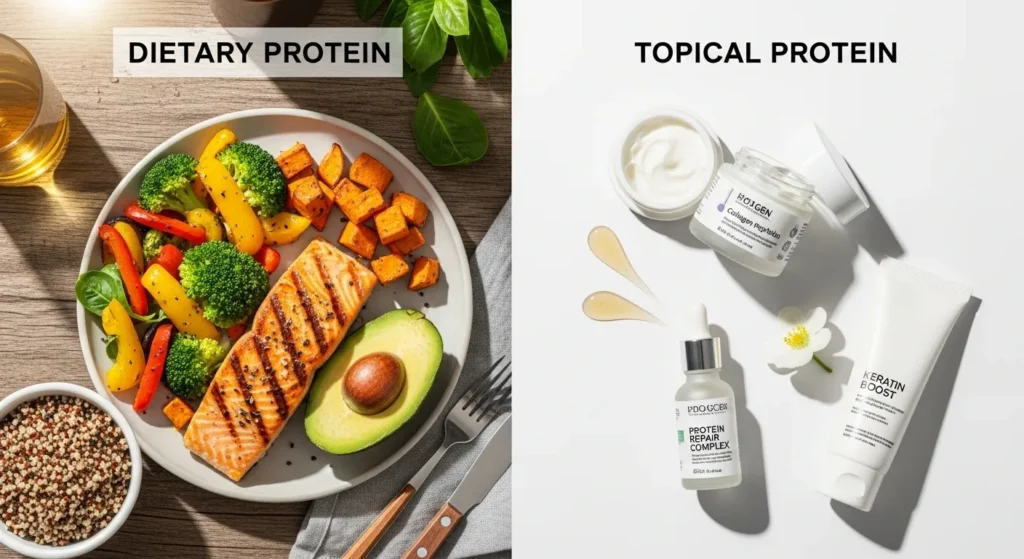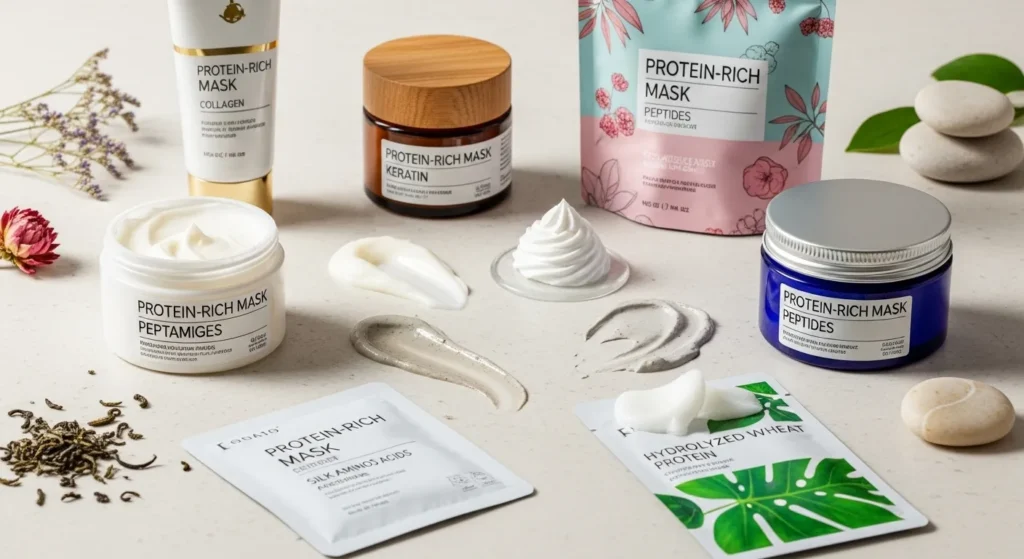If you’re worried that your high-protein diet might be at the root of thinning hair, you’re not alone. Can too much protein cause hair loss?
This article separates myth from science. You’ll learn why protein is essential for hair health, how excess intake or dietary imbalance may indirectly trigger shedding, and expert-approved ways to protect your locks.
With clear signs to watch for, practical diet tips, and medical insights, this guide offers trustworthy answers grounded in science.
What Does Science Say About Excessive Protein Intake and Hair Health?
Dietary vs. Topical Protein: Key Distinctions

Protein’s role in hair health is complex, and not all “too much protein” situations are the same.
- Dietary protein: Consumed from food or supplements and used by the body for muscle repair, tissue growth, and hormone production.
- Topical protein: Found in shampoos, conditioners, and masks; strengthens the hair shaft externally but can cause “protein overload” if overused.
The two shouldn’t be confused—eating extra chicken breast and overusing keratin hair masks are entirely different scenarios.
Protein Metabolism & Safe Intake Levels
The human body doesn’t store protein the way it stores carbs or fats. Any excess is broken down and excreted. The Recommended Dietary Allowance (RDA) is around 0.8 g per kg of body weight, but athletes or bodybuilders may safely consume more (1.2–2.0 g/kg), provided the diet remains balanced.
Importantly, there is no established “upper limit” for protein intake, but extremely high, long-term consumption without adequate micronutrients can impact overall health, including hair.
Hormonal Effects & the DHT Question
Some theories suggest that certain high-protein diets, especially those rich in animal protein, could increase levels of dihydrotestosterone (DHT), a hormone linked to androgenetic alopecia (pattern hair loss).
- Current research: The evidence is inconclusive. Genetics, stress, and overall diet quality play much larger roles in most hair loss cases.
How a High-Protein Diet Can Indirectly Affect Hair Loss
Low-Carb/Ketosis Trade-Offs
High-protein diets often come hand-in-hand with low carbohydrate intake, as in keto or Atkins plans. This can:
- Reduce intake of B vitamins and minerals from whole grains and fruits.
- Lead to telogen effluvium, a temporary shedding phase caused by nutrient imbalance and body stress.
Nutrient Imbalance & Impaired Hair Cycle
Hair follicles are highly sensitive to nutritional status. Even with adequate protein:
- Low iron can impair oxygen delivery to follicles.
- Zinc and biotin deficiencies can weaken hair structure.
- Lack of healthy fats may affect scalp health and sebum production.
Recognizing Signs of Protein-Related Hair Issues
Hair Texture Changes
If you’re experiencing:
- Brittle, straw-like strands
- Loss of elasticity
- Dull appearance
…it could be protein overload from hair products rather than diet. Clarifying shampoos and deep conditioning treatments can help restore balance.
Shedding vs. Growth Cycle Disruption
Excessive dietary protein alone is unlikely to cause massive shedding. More often, it’s an imbalance—too much protein but too few vitamins/minerals—that shifts follicles into the resting (telogen) phase, increasing daily hair fall.
Recommended daily intake chart (per kg body weight):
- Sedentary adult: 0.8–1.0 g
- Active individual: 1.2–1.6 g
- Strength athlete: 1.6–2.0 g
When to seek professional help:
- Sudden or severe hair shedding
- Persistent brittle hair despite good care
- Hair loss accompanied by fatigue or other systemic symptoms
How to Maintain Hair Health While Following a High-Protein Diet
Balance Macronutrients
- Include complex carbs (brown rice, quinoa, whole grains) for B vitamins.
- Don’t skimp on healthy fats (avocado, nuts, olive oil) for scalp health.
Choose Quality Protein Sources
- Plant-based: Lentils, quinoa, soy, chia seeds (rich in micronutrients).
- Lean animal sources: Fish, poultry, eggs (avoid over-reliance on processed meats).
Avoid Protein Build-Up in Hair Care
- Use a clarifying shampoo once a month if using keratin/protein hair products.
- Alternate protein-rich masks with moisturizing treatments.

Frequently Asked Questions
Can excess dietary protein by itself cause hair loss?
Rarely. Hair loss usually occurs due to nutritional imbalance, not protein alone.
2. How much protein is safe for hair health?
For most adults, 0.8–2.0 g/kg body weight is safe if paired with a balanced diet.
3. Are protein shakes harmful to hair?
Not inherently, but avoid replacing whole foods entirely.
4. Can protein increase DHT?
Some animal proteins may raise DHT slightly, but genetics and other factors play a larger role.
5. How soon can hair recover after rebalancing the diet?
Typically 3–6 months, depending on the cause and overall health.
Next Steps
Worried about diet-related hair loss or changes in your hair’s texture? Get expert guidance from a qualified trichologist. Book a consultation with Dr. Rana Irfan in Islamabad today to protect your hair’s health and get a personalized nutrition and treatment plan.
